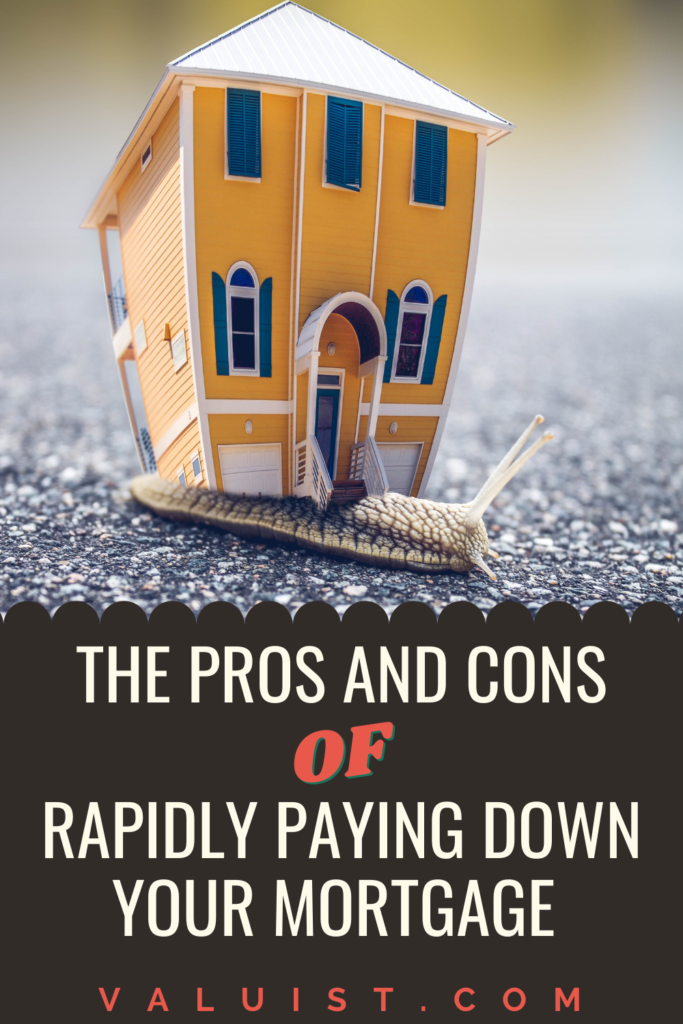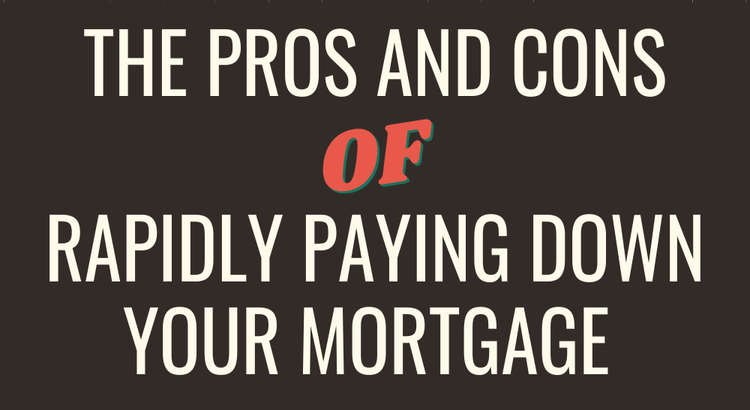The cost of buying a home is going up. In some places housing costs are increasing so rapidly that average Americans and are forced to rent long-term (or even for life). So, it makes sense that so many people, even some financial professionals, are espousing the benefits of owning your home free and clear, as quickly as possible.
The idea that typical American home owners should pay down mortgage debt rapidly is nothing new. The sentiment certainly makes sense at face value; by eliminating your mortgage payment you free up a huge chunk of cash. You also no longer have to pay the bank interest, which must feel incredibly liberating. However, there are also significant problems with strategies that prioritize rapidly paying down your mortgage, namely “opportunity loss,” which complicate the issue.
Here we will examine the pros and cons of paying down a home loan, to uncover the ideal approach to tackling mortgage debt. For additional feedback I asked for responses from real estate professionals, as well as the general public, at Quora.
1. Paying Off a Mortgage, PRO: Mortgage interest is “front-loaded”
It makes no financial sense at all not to make [additional] principal payments. On a mortgage, interest is front loaded and compounded daily, so you pay the highest interest at the outset. The faster you can pay off principal, the less you will pay in the long run and the faster you build equity.
Susan Cooper, Realtor at Coldwell Banker Schmidt Realtors (2006-present). Asked via Quora.
Because a mortgage is amortized to provide equal monthly payments, the amount of your mortgage payment that is applied to principal and interest changes over time. Obviously the loan is highest before any payments are made, so, the interest amount is necessarily highest when the loan is first taken. Because so much of your payment is allocated to interest, it may make sense to make extra payments towards the principal to build up equity that you can take with you when you sell.
However, the “front-loaded interest” argument is often conflated as a way for lenders to take advantage of home-owners. This argument is nonsensical, lenders receive the interest they are entitled to during the life of the loan, regardless of how long you hold it. If lenders really derived substantial profits from higher interest payments in years they would prefer longer term loans (30+ years) and charge higher rates on shorter term loans, since interest payments on shorter term loans are reduced so much quicker. The opposite is true, however, as 15 year loans are cheaper to finance and are are clearly preferred by lenders.
2. CON: You may be prioritizing less impactful debt
The reason why you don’t hurry to pay down your mortgage, particularly if you plan on not keeping it for the long-term, is that the interest on your mortgage is probably the cheapest interest you have. Generally speaking, only your vehicle may have a lower interest rate on it. So, instead of paying down the principal on the mortgage, you should be paying down any other debts that you have as you are paying more in interest in them than on the mortgage.
Mark Mills, Career Supply Chain Professional and Railroader. Asked via Quora.
It makes no sense to quickly pay off a 3-5% mortgage if you have other, higher impact debt, like credit card or tax debt that you need to resolve. Also, you probably shouldn’t make additional principal payments on your mortgage until you have saved up sufficient emergency funds and prioritize your savings appropriately.
3. PRO: You free up significant cash flow (in the future)
Housing costs represent the highest expense that most people will ever have. So, eliminating your monthly mortgage payment frees up a potentially huge amount of cash that may be used to improve your quality of life. This is especially true for older home owners who have diligently paid down their mortgages for decades, but is perhaps an equally powerful draw for younger home owners who hate the idea of paying interest to banks and have extra cash to allocate to principal-only payments.
4. CON: You tie up significant cash flow (now)
Opportunity loss is perhaps the biggest issue with the idea of quickly paying down your home mortgage. Unless you have a lot of disposable income, throwing extra payments into your mortgage reduces your current cash flow and limits your ability to protect yourself during financial hardships. Paying down your mortgage at an advanced pace also reduces the amount you can use to invest. Even if you have extra disposable cash, anytime you allocate funds to paying off a 3-5% debt obligation you are missing the chance to earn more money in the stock market (7-9% on average) or with other investments.
I think the main reason that so many people put extra money into their homes, rather than the stock market, is because the stock market is harder to conceptualize and more mysterious to average consumers. Most people aren’t comfortable enough investing to feel confident that they are making sound decisions but, they know that even in the worst case scenario that can still live in a house that’s paid off. Also, housing market crashes occur much more infrequently than stock market crashes and this decreased volatility helps inspire confidence in the housing market.
5. PRO: Emotional freedom
Perhaps the biggest benefit to paying off your home is an emotional one. Once you pay off your home you have a tangible asset that you can live in for very little annual cost. When you have been paying a rent or mortgage payment for the last 30 years, owning your home outright must feel like an incredible accomplishment. You can convert your asset to cash by selling it or you can live without a monthly payment for the rest of your life. You also never have to pay interest to the bank again.
6. CON: Storing cash/equity in home-equity is risky
If you do not plan to live in the house for long, storing cash in home valuation is risky. There is only downside actually. Pay one extra dollar. If the house value stays flat or goes up, it is still only a dollar you are taking out. If the price of the house goes down, that dollar is at risk.
Robert Adams, Asked via Quora.
An additional downside to “storing” cash in equity, is the same downside as putting your money almost anywhere, you risk the asset’s value eroding. Even if you were to keep your money in cash, it begins to lose money to inflation. The difference, however, between real estate and intangible investments like stocks, is that your ability to convert your home to cash is much, much more difficult and depends on numerous factors that are out of your control, such as the region, current market and relative difficulty in selling a home when compared to stocks.
In short, if you make a lot of additional payments towards loan principal and the value of your house is significantly reduced, you not only experience opportunity loss you actually lose money if you sell. Upside-down loans, wherein you owe more than the home is worth, force you to stay in place and may cost your much more than if you had simply stuck to your mortgage amortization schedule.
_______________
In summary, whether or not you should allocate additional payments to home-equity depends on a number of factors including your debt load, age, the housing market in your area and your comfort level with other investments. In today’s low-interest loan environment and record-breaking stock market, it sure seems like a mistake not to be investing, but only if your comfortable with the stock market. Given that for most people investment choices tend to be driven by emotion, it makes the most sense to put your money into assets you understand and that allow you to sleep at night.



Loved the article. Although, I do intend to have zero mortgage payments as soon as I can 😀